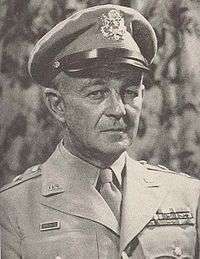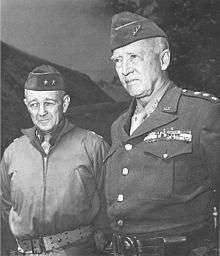Hugh Joseph Gaffey
| Hugh Joseph Gaffey | |
|---|---|
 | |
| Born |
November 18, 1895 Hartford, Connecticut, United States |
| Died |
June 16, 1946 (aged 50) Godman Army Airfield, Kentucky, United States |
| Allegiance |
|
| Service/branch |
|
| Years of service | 1917–1946 |
| Rank |
|
| Unit |
|
| Commands held |
2nd Armored Division 4th Armored Division XXIII Corps |
| Battles/wars |
World War I World War II |
| Awards |
Army Distinguished Service Medal (2) Silver Star Legion of Merit Bronze Star (2) |
Major General Hugh Joseph Gaffey (November 18, 1895 – June 16, 1946) was a senior United States Army officer. He was a career officer who served in both World War I and World War II.
Biography
Early life and military career
Born in Hartford, Connecticut, Gaffey graduated from Worcester Academy in 1916 and later attended Officers Training School at Fort Niagara, New York, and was commissioned as a second lieutenant in the Field Artillery Branch of the United States Army Reserve on August 15, 1917, four months after the American entry into World War I. Assigned to the 312th Field Artillery Regiment, part of the 79th Division, at Fort Meade, Maryland, in August 1918 he was sent to the Western Front to serve with the American Expeditionary Force (AEF). He later served in Germany with the 12th Field Artillery Regiment, part of the 2nd Division, before returning to the United States in August 1919, nine months after the war came to an end with the signing of the Armistice with Germany.[1]
Between the wars
During the next two decades in the interwar period, he transferred to the Regular Army and was soon promoted to first lieutenant. He joined the 15th Field Artillery Regiment in 1922 and entered the U.S. Army Field Artillery School at Fort Sill, Oklahoma. Graduating from there in 1926, he became a Professor of Military Science and Tactics at Cornell University, New York. In 1935 he attended the U.S. Army Command and General Staff School at Fort Leavenworth, Kansas. He graduated the following year and was assigned to the 68th Field Artillery Regiment (Mechanized).[2]
World War II

By July 1940, during World War II (although the United States was still neutral at this point), he was a G-3 staff officer with I Armored Corps. He served with the corps until July 1942, seven months after the American entry into the war. He was appointed to the one-star rank of brigadier general a month later, on August 5, 1942, and was sent to England in November. Soon afterwards he was sent to Morocco in North Africa to command Combat Command B of the 2nd Armored Division. He later served as chief of staff of II Corps, then fighting in North Africa, commanded by Lieutenant General George Patton, who was later replaced by Major General Omar Bradley. In May 1943 he was promoted to the two-star rank of major general and became Commanding General (CG) of the 2nd Armored Division. He commanded the division in the Allied invasion of Sicily (Operation Husky) in the summer of 1943. The division was sent to England later in the year to train and spearhead the invasion of Normandy (Operation Overlord), scheduled for the following year. In April 1944, he was designated chief of staff of the Third Army, serving again under George Patton and served in that capacity through the campaign in Western Europe. In December 1944, he replaced Major General John Wood as CG of the 4th Armored Division, which played a major role in the Battle of the Bulge, helping to break the siege of Bastogne. He remained in command of the division until March 1945, towards the end of the war in Europe, when he became CG XXIII Corps, relinquishing command in September. For his services during the war he was twice awarded the Army Distinguished Service Medal.[3]
Postwar
In June 1946, Gaffey was the CG of Fort Knox, Kentucky when he was killed in a B-25 Mitchell crash as it attempted to land at Godman Field, Kentucky. He was buried at the post cemetery.
Namesake
The U.S. Navy transport ship USNS General Hugh J. Gaffey (T-AP-121) was named in his honor on March 1, 1950.
References
- ↑ http://www.findagrave.com/cgi-bin/fg.cgi?page=gr&GRid=51491848
- ↑ George Forty, 4th Armored Division in World War II, p. 105-106
- ↑ http://valor.militarytimes.com/recipient.php?recipientid=27277
- This article incorporates text from the public domain Dictionary of American Naval Fighting Ships.
| Wikimedia Commons has media related to Hugh J. Gaffey. |
| Military offices | ||
|---|---|---|
| Preceded by Ernest N. Harmon |
Commanding General 2nd Armored Division 1943–1944 |
Succeeded by Edward H. Brooks |
| Preceded by John Shirley Wood |
Commanding General 4th Armored Division 1944–1945 |
Succeeded by William M. Hoge |
| Preceded by James Van Fleet |
Commanding General XXIII Corps March 1945 – September 1945 |
Succeeded by Frank W. Milburn |